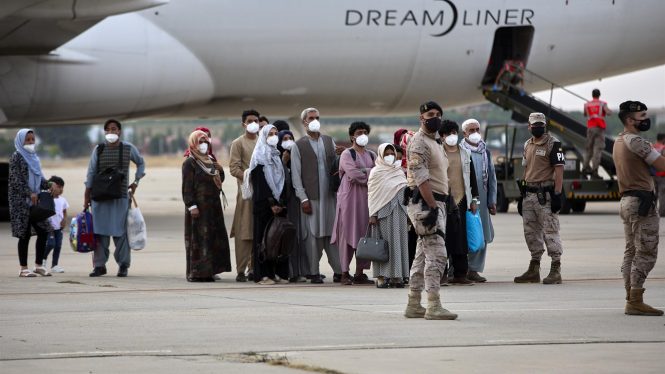More than 60% of the 1,650 Afghans who requested international protection in Spain when leaving their country due to the coming to power of the Taliban have refugee status issued by the Asylum and Refuge Office six months later, according to Europa Press Ministry of the Interior sources.
In the Asylum and Refuge Office, 1,650 applications for international protection of Afghan citizens have been processed between August 2021 and February 8, 2022.
According to data from the office dependent on the Ministry of the Interior, a total of 1,037 applications have been resolved favorably with the granting of refugee status after six months of the evacuation of some 1,900 Spanish collaborators, who fled the country hastily.
The situation in Spain of Khadija and Abdul
The Government enabled a procedure at the Torrejón de Ardoz Air Base (Madrid) to expedite the procedures for the arrival of the Afghan population on military flights, who in many cases traveled with their families and children.
Khadija Zahra Ahmadi is one of the Afghans who was evacuated by Spain from Kabul. When the Taliban took power, she worked as an adviser in the Ministry of the Interior, but before that she had been the second female mayor of the country, a position she had to leave due to the threats to which she was subjected, since she is also a member of the Hazara minority.
She and her family now live in a reception center in Zaragoza , where they receive help from the Red Cross, and they are about to complete all the paperwork and receive the documentation that accredits them as refugees. Khadija has been studying Spanish since she arrived and next week she has her exam: “My priority now is to pass level A1”.
These almost six months that he has been in Spain have not been easy, he admits to Europa Press. She and her older sister are receiving “help from a psychologist” for the “depression” that what happened has caused them and she is fully aware that what is to come will be “hard”, such as the job search.
To try to overcome the trauma she has experienced, she is in contact with other Afghan refugee women like her with whom they share experiences and give each other advice.
But Khadija does not forget the women who remain in Afghanistan, where many of them are persecuted and “kidnapped” by the Taliban. For this reason, she is clear that if she survived, it was “to be the voice of other women who are there.”
For his part, Abdul Basir Shakeri is also among those who have already received asylum in Spain, awaiting the identity document that proves it. Along with him, his parents, his sister, his brother-in-law and three of his nephews are also in the same situation.
Before leaving Kabul, he was the Director of Administration for the National Security Council and worked inside the Presidential Palace. Now, he tells Europa Press that he is preparing for the university entrance exam because he wants to study architecture.
“I have to try,” he says, aware of how complicated his bet is, although in his case he has a good level of Spanish since he lived for a few years in Colombia.
Like Khadija, he is happy to be in Spain and now what he wants is to be able to find a flat to settle in with his parents. “They need privacy, to be able to cook whatever they want and not depend on schedules,” he explains, referring to the fact that the family resides in a reception center in Madrid.
Abdul also remains in contact with family and friends who are still in Afghanistan and acknowledges his helplessness in not being able to do anything to help them. According to him, he has passed the contacts of some of the people who have asked for help to the Spanish embassies in Iran and Pakistan, but he admits how complicated it is for them to be able to confirm if these people are in a vulnerable situation.

